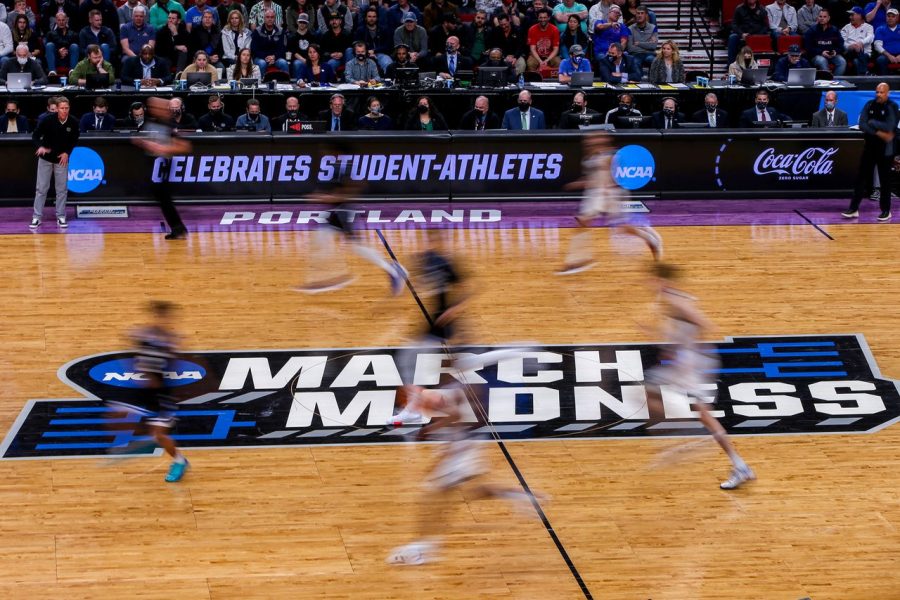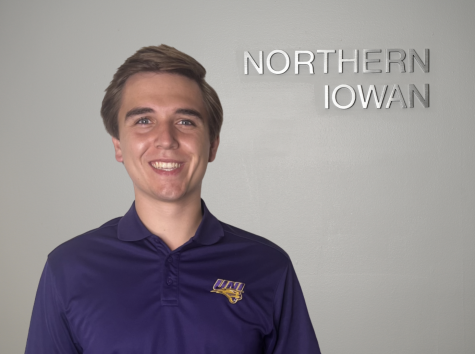What causes all this madness in March?
Each year during the NCAA men’s basketball tournament, there always seems to be a lower-seeded, underdog team that knocks off the best teams in the tournament. Many factors contribute to possible reasons for this, but one things is certain upsets are practically guaranteed to happen each March.
Mar 21, 2022
The term March Madness has become so deeply ingrained into American society that if you ask any random person on the street, they will likely be able to tell you that this phrase is referring to the NCAA Men’s Basketball Tournament. This phrase, first used by legendary sportscaster Brent Musburger in 1982, came to be because of the fact that the tournament occurs every year in March, and that there tends to be a lot of shocking upsets. Looking at the history of upsets in this tournament, it begs the question, “why?” Why do the teams that are supposed to be out in the first round so often make a deep run into the tournament? As it turns out, there are multiple reasons as to why lower seeds and smaller schools so often pull off the upset.
To start looking at all of these upsets, it is helpful to look at the upset that hits closest to home for those in the Cedar Falls area. Coming into the 2009-2010 season, University of Northern Iowa men’s basketball head coach Ben Jacobson had high expectations for his Panthers after seeing what a very young team did the year before.
“In 2008-2009, we got to Christmas and we were 7-6, and then we got going,” said Jacobson. “We ended up 14-4 in the league (Missouri Valley Conference), we won the conference tournament, and that got us the bid to the NCAA Tournament.”
The Panthers, who had only one senior on the roster, would go on to lose to the Purdue Boilermakers by just five points, 61-56, in the opening round of the tournament, setting the stage for an exciting 2009-10 season.
The Panthers had a rocky start to their 2009-10 season, losing their second game to DePaul, 60-52. However, after this early-season loss, UNI went on to win their next 15 games, including wins over in-state rivals Iowa and Iowa State. The Panthers would finish the regular season with a record of 27-4, clinching the MVC regular season championship, before easily cruising through the MVC Tournament, clinching their spot in the NCAA Tournament. In the opening round, UNI was matched up against the UNLV Runnin’ Rebels. In a very tight game, the Panthers came out on top, 69-66, thanks to a late three-pointer by senior guard Ali Farokhmanesh. This victory set up a matchup in the Round of 32 against the top-ranked team in all of college basketball, the Kansas Jayhawks.
The Jayhawks, led by Hall of Fame head coach Bill Self, as well as future NBA players and twin brothers Marcus and Markieff Morris, entered with a record of 33-2 and were regarded as the overwhelming favorites. At the press conference the day before the game, Jacobson was asked several times about whether or not he had a chance to win.
“Finally I was like ‘hey look, we have a really good team. Our guys expect to win. I know who we’re playing tomorrow, but I’m just telling you, our guys expect to win, just like they have all year long.’”
This comment would end up getting into the Kansas locker room, causing some tension on the court during pregame warmups.
“It got to their players, so then their players were talking to our players in warmups, and our players were giving it back to them a little bit.” This set the stage for an intense 40 minutes of basketball.
Cole Aldrich of the Jayhawks scored the opening bucket of the game, giving Kansas a 2-0 lead. After this, the Panthers would go on a 10-0 run to take a 10-2 lead and force Kansas to call a timeout. It was at this point that Jacobson knew without a doubt that his team was going to stick around with the nation’s best.
“(Jordan) Eglseder made a three, Johnny (Moran) made a three in transition to get it to 10-2, Kwadzo (Ahelegbe) had attacked the basket and gotten fouled and made two free throws, and I think Jordan had scored inside,” said Jacobson, still vividly remembering the opening minutes of the game that occurred 12 years ago. “It was that early in the game that, I didn’t know if we were going to win or if we were going to get beat, but I knew that we were going to be in the game.”
The Panthers continued their strong play, holding a lead of around eight points for the majority of the game until the Jayhawks got the score closer in the closing minutes. Leading by just one point with 35 seconds remaining and almost no time off of the shot clock, Farokhmanesh pulled up for what is now one of the most famous three-pointers in college basketball history. The clutch three-pointer went through the net, giving UNI a 66-62 lead and putting the game away.
Jacobson was not at all surprised that his senior guard decided to take the shot. “As soon as he (the defender) started to back up and Ali caught it, I knew he was going to shoot it.”
The Panthers ended up winning by a final score of 69-67. They would ultimately fall in the Sweet Sixteen to the Michigan State Spartans, 59-52.
There were a number of factors that led the Panthers to this fantastic season and amazing upset victory, but Jacobson was quick to point out three key factors: their competitiveness in practice, how diligently they prepared, and how talented their roster was.
“We had really good players,” said Jacobson. “We had really good depth. We played nine guys and some nights we played 10 guys. So we had depth if someone got in foul trouble, or if somebody just wasn’t playing quite as good as they normally do. We could play other guys”.
Jacobson believes that maturity and experience have a lot to do with smaller schools pulling off so many upsets in the NCAA Tournament. “Eglseder was a senior, (Adam) Koch was a senior, Farokhmanesh was a senior, we had guys on the bench that had been in our program, we had older players,” said Jacobson. “A lot of times those teams (that pull off upsets) are older. And that’s a big deal, because as you get games under your belt, when you get to be a junior and you get to be a senior, nothing phases you.”
To compare the teams, UNI started three seniors, a junior, and a sophomore, while Kansas started only one senior, as well as a junior, two sophomores and a freshman.
Another person with first-hand experience regarding NCAA Tournament upsets is Oral Roberts University men’s basketball head coach Paul Mills. Last March, Mills led his Oral Roberts Golden Eagles to the tournament as a 15-seed, and they were matched up against the Ohio State Buckeyes in the opening round. Given little chance by basketball journalists and commentators, the Golden Eagles captured the nation’s attention when they shocked the Buckeyes in the Round of 64. They would go on to a repeat performance in the Round of 32, defeating the Florida Gators to become only the second 15-seed to ever make it to the Sweet Sixteen. They would fall just short in their next matchup, 72-70, ending their March run against the three-seed Arkansas Razorbacks.
Mills believes that the biggest factor in his team pulling off this upset was their mindset that, despite the rankings and predictions, they were never the underdog. “Our players didn’t consider another team superior, therefore we never viewed the game as if we were at a disadvantage,” said Mills.
In regards to so many smaller, mid-major schools pulling off upsets over the traditional powerhouses, Mills argued that prestige and revenue cease to matter when you step onto the court. “Teams don’t think someone is superior to them simply because they have more money.”
Ultimately, there are many reasons why teams pull off upsets, but there is one thing that’s for sure, leading your team to March upsets is an incredible feeling. As Jacobson explained, “It feels so great. I’m so proud of our guys for putting in the kind of time it takes to be good.”









